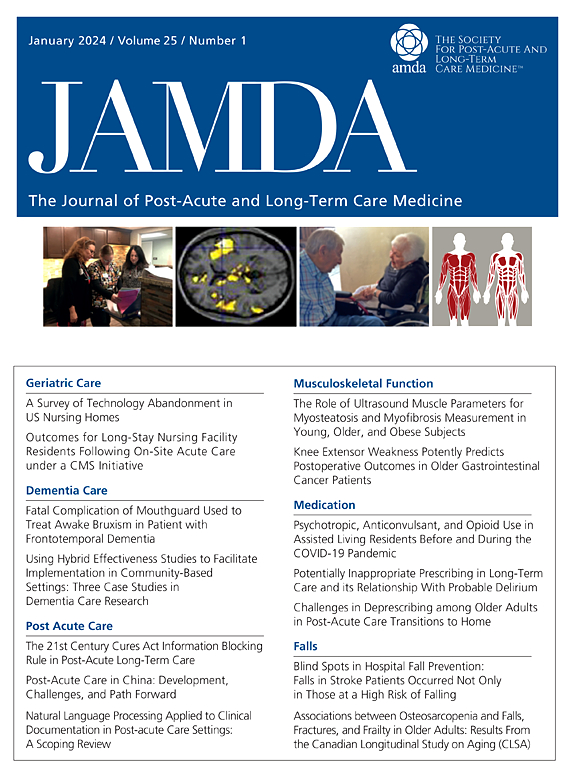Longitudinal, Bidirectional Association between Gait Speed and Cognitive Function in Community-Dwelling Older Adults without Dementia
IF 4.2
2区 医学
Q2 GERIATRICS & GERONTOLOGY
Journal of the American Medical Directors Association
Pub Date : 2025-03-24
DOI:10.1016/j.jamda.2025.105544
引用次数: 0
Abstract
Objectives
The causal relationship between slow gait speed and poor cognition is uncertain due to potential reverse causality. This study aimed to examine the reciprocal relationship between gait speed and global as well as domain-specific cognitive functions in older adults.
Design
Prospective cohort study (2013–2022) including 4 repeated measures.
Settings and Participants
Community-dwelling and adults without dementia aged ≥65 recruited at baseline.
Methods
Biennial evaluations included assessments of 4-m usual walking speed, global cognition using the Taiwanese version of the Montreal Cognitive Assessment (MoCA), and cognitive domains (memory, executive function, verbal fluency, and attention) using a battery of neuropsychological tests. Cross-lagged models and linear mixed models were used to examine the bidirectional association between gait speed and cognitive functions with adjustment for potential confounders.
Results
At baseline, 511 participants were enrolled, and 459 individuals with a mean age of 74.5 years were ultimately analyzed. A 1-SD decrease in gait speed was associated with a 0.07–0.09 SD decrease in subsequent global cognition [ Wave 1→2: 0.07, standard error (SE): 0.03; Wave 2→3: 0.09, SE: 0.04; Wave 3→4: 0.09, SE: 0.04; all P < .05]. Similarly, a 1-SD decrease in global cognition was associated with a 0.18 to 0.19 SD decrease in subsequent gait speed ( Wave 1→2: 0.18, SE: 0.05; Wave 2→3: 0.18, SE: 0.06; Wave 3→4: 0.19, SE: 0.07; all P < .001). In addition, slower gait speed was associated with poor memory, verbal fluency, and executive function, and vice versa. The results of linear mixed models were consistent with the findings obtained from cross-lagged models.
Conclusions and Implications
This study found a reciprocal association between gait speed and global or domain-specific cognition. Regularly screening gait speed and cognitive function enables the early detection of declines in physical function and cognition.
求助全文
约1分钟内获得全文
求助全文
来源期刊
CiteScore
11.10
自引率
6.60%
发文量
472
审稿时长
44 days
期刊介绍:
JAMDA, the official journal of AMDA - The Society for Post-Acute and Long-Term Care Medicine, is a leading peer-reviewed publication that offers practical information and research geared towards healthcare professionals in the post-acute and long-term care fields. It is also a valuable resource for policy-makers, organizational leaders, educators, and advocates.
The journal provides essential information for various healthcare professionals such as medical directors, attending physicians, nurses, consultant pharmacists, geriatric psychiatrists, nurse practitioners, physician assistants, physical and occupational therapists, social workers, and others involved in providing, overseeing, and promoting quality

 求助内容:
求助内容: 应助结果提醒方式:
应助结果提醒方式:


